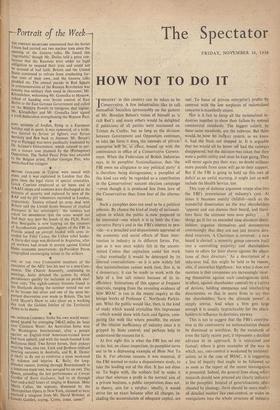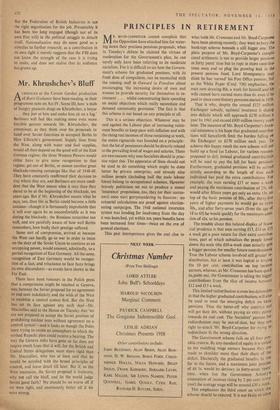HOW NOT TO DO IT
TNDUSTRY' in this country can be taken to be 'Conservative. A few industrialists like to call. themselves Socialists (presumably on the pattern of Mr. Brendan Behan's vision of himself as 'a rich Red'); and many others would be delighted if politicians of all parties were marooned on Tristan da Cunha; but so long as the division between Government and Opposition continues to take the form it doesk the interests of private enterprise will' be, in effect, bound up with the continuance in office of a ConservatiVe Govern- ment. When the Federation of British Industries says, in its pamphlet NotiOnalisation, that 'the FBI owes no allegiance to any political party' it is. therefore being disingenuous; a pamphlet of thjs kind can only be regarded as a contribution to the Conservatives' nascent election campaign --L-even though it is produced less from love of the Conservatives than from fear of the alterna- tive.
Such a pamphlet does not need to be a political polemic. By chance the kind of study of nationali- sation in which the public is now prepared to he interested—one which it' is in both the Con- servative Party's and in the FBI's interest to pro- vide—is a detached and dispassionate appraisal of the economic and social effects of State inter- vention in industry in its different forms. For, just as it was once widely felt in the uncom- Mitted Centre that capitalism could not work ---that eventually it would be deitroyed by its internal contradictions—so it is now widely felt that nationalisation cannot work (not, that is, in a! democracy; it can be made to work with the help of a few salt mines) because of its in- efficiency. Intimations of this appear at frequent intervals, ranging from the revealing evidence of how BOAC is run in the recent .inquiry to the benign Works of Professor C. Northcote Parkin- sOn. What the public would like, then, is the kind of study which would crystallise this impression —which would show with facts and figures, com- paring like with like where possible, the extent of the relative inefficiency of industry once it is gripped by State control; and perhaps help to understand the reasons for it.
At first sight this is what the FBI has set out to do; but, on closer inspection, its pamphlet turns out to 'be a depressing example of How Not To Do It. For obvious reasons it was essential, if the FBI wanted to make a dispassionate study, to take the loading out of the dice. It has not done so. To begin with, the authors fail to make it clear that whereas a profit is the normal aim of a private business, a public corporation does not, in theory, aim for a surplus : ideally, it would strive for an exact balance after all charges, in- cluding the accumulation of adequate capital, are met. To boast of private enterprise's profits by contrast with the low surpluses of nationalised concerns is manifestly unjust. Nor is it fair to lump all the nationalised in- dustries together to show their failure by normal commercial standards. The biggest culprit, by these same standards, are the railways. But there woul&be how no railway system, as we know it, had the State not stepped in. It is arguable that' we would all be better off had the railways disappeared; but the decision was taken that they were a public utility and must be kept going. They will never again pay their way; no doubt millions more pounds from taxes will go to their support. But if the FBI is going to hold up this sort of deficit as an awful warning, it might just as well include the Health Service, too.
This type of dubious argument creeps also into the FBI's presentation of industry's case. At times it becomes merely childish--such as the wonderful dissertation on the way shareholders 'appoint and can dismiss their board, and there- fore have the ultimate veto over policy . . • if things go. ill for an extended time dissident share- holders organise themselves and demonstrate convincingly that they are not just passive divi- dend receivers. A Chairman is removed : a new board is elected; a minority group converts itself into a controlling majority; and shareholders listen to offers for their shares against the objec- tions of their directors.' As a description of a take-over bid, this might be held to be reason- able, if somewhat highflown : but what it does not mention is that companies are increasingly insur-. ing themselves against such contingencies (and. in effect, against shareholder' control) by a variety of devices, holding companies and interlocking directorates, so that in many firms to say that the shareholders 'have the ultimate power' is simply untrue. And when a firm gets large enough it is usually impracticable for the share- holders to influence its destinies, anyway.
This is not to suggest that the FBI's contribu- tion to the controversy on nationalisation should be dismissed as worthless. By the standards of even the fairly recent past; it 'represents a decided advance in its approach. It is restrained and factual; where it gives examples of the way in which, say, cost-control is weakened by nationali- sation, as, in the case of BOAC, it is suggesting a line of inquiry that ought to be followed up as soon as the report of the recent investigation is presented. Indeed, the general lines along which research should now proceed are clearly indicated in the pamphlet. Instead of generalisations, often clouded by ideology, there should be more studi of detailed matters' like cost-control, or wider in- vestigations into the whole structure of industry. But the Federation of British Industries is not the right organisation for the job. Presumably it has been too long engaged (though not of its own free will) in the political struggle to detach itself. Nationalisation may do some good as a stimulus to further research; as a contribution in its own right it merely suggests that the FBI does not know the strength of the case it is trying to make, and does not realise that its audience has grown up.







































 Previous page
Previous page